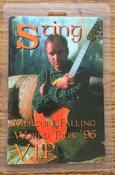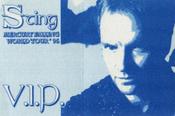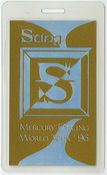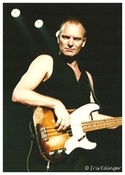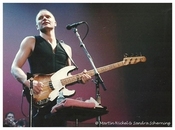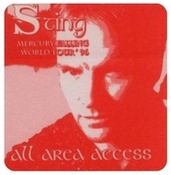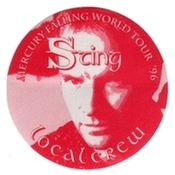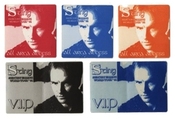
Mercury Falling
Feb
28
1997
New York City, NY, US
The Theater at Madison Square Gardenwith Paula Cole
Well-paced, musically sophisticated two-hour show...
Sting, who has become an indomitable warhorse of touring, finally brought his 'Mercury Falling' show to New York for a series of five shows. The well-paced, musically sophisticated two-hour show reaffirmed the former Policeman's evolution into an adult-oriented pop jazzman whose name is the most threatening thing about him.
Showcasing his latest CD, an uncommonly subtle and textured collection whose melodies require multiple listens before digging themselves into your head, Sting led his five-piece band through a show that also encompassed songs from his solo career as well as a few Police-era classics.
The current band, which has been touring for the better part of a year, displayed a polish and crispness that did justice to the often complicated music. Beginning with 'The Hounds of Winter', the lead-off track from the new album, Sting and Co. were faithful to the recorded versions of the songs, although there were often inventive instrumental flourishes. This was the kind of unusual pop show that featured tuba and trombone solos. Kenny Kirkland's keyboards offered jazzy embellishments on such songs as 'If You Love Somebody Set Them Free' and 'Roxanne', the latter of which was performed in a slowed tempo that spotlighted Sting's vocals.
The singer seemed unusually ebullient, joking with the audience about his recent Grammy losses. He was at his charming best when he brought up two fans from the crowd to provide backup vocals on 'I'm So Happy I Can't Stop Crying'. The two sang with gusto and scored huge cheers from the crowd. Sting leaped through musical styles with abandon, effortlessly segueing from the hard rock of 'Demolition Man' to the soft jazz stylings of 'An Englishman in New York'. The latter was marred by a heavy-handed rap interlude, one of the evening's few missteps. Much better was the extended jam session on 'When the World is Running Down', as well as a rousing version on 'Every Little Thing She Does is Magic'.
The encores included the haunting 'Fragile' and the classic 'Every Breath You Take'. Regarding the latter, it's indicative of Sting's stylistic evolution that what used to be a threatening statement of obsession now seems like a comforting love song. Sting is known for the quality of his opening acts, and this show was no exception.
Singer-songwriter Paula Cole delivered a short but powerful set spotlighting songs from her new release, 'This Fire' (Warner Bros.). Supported by three musicians, and occasionally accompanying herself on piano, Cole sang emotionally intense numbers such as Me with a fervor that recalled early Joni Mitchell. Although she was less convincing when she tried to rock out, this refreshingly unglamorous singer is a strong contender in a marketplace so hospitable to similar performers like Tori Amos.
(c) The Hollywood Reporter by Frank Scheck
Fans keep falling for the old Sting...
Call it Sting unstiffens. Around halfway through the ex-Policeman's two-hour set at the Theater at Madison Square Garden Friday night, the rest of his sextet suddenly filed offstage.
''This is a very difficult decision for a man to make,'' Sting said, looking a bit abashed, like a kid caught playing hooky. ''There are 5,000 people here.'' With that, he picked two from the crowd who claimed to know 'I'm So Happy I Can't Stop Crying', his tongue-in-cheek country-and-Western parody about - what else? - D-I-V-O-R-C-E. The song is from his latest CD, 'Mercury Falling'.
''Karen'' (married, but at the show without her husband) and ''Danny from Jersey'' (a single father ''with a baby on the way,'' also solo for the night) swapped one-liners with the rock star as he prepped them to sing backup.
The full house loved it - especially when Sting capped the shtick by squirting the throat spray he offered the neophytes under his arms as if it were deodorant.
Though his albums and interviews can sometimes seem a bit overprecious, Sting has always been a killer performer who'll do whatever it takes to get to his audience. Friday night was no exception.
Launching the well-paced show with five tunes from 'Mercury', Sting then cunningly laced in old faves with the newer material.
When he followed 'If You Love Somebody' with a pulsing take on 'Every Little Thing She Does Is Magic' half an hour into the set, the crowd, which had been respectful and eager, melted almost visibly. From then on, they were all his.
Musically, he gave 'em what they came for - and more. His nimble sextet worked effectively, if not always brilliantly, through a musical potpourri tracing Sting's manifold influences: rock and soul music, reggae, folk music, Brazilian and African sounds, and, of course, jazz.
Sting's long-time keyboard collaborator, Kenny Kirkland, used to play with Wynton Marsalis, and still keeps his hand in the genre with old pals like saxist Kenny Garrett. so it was a nice breakout from the set's more tightly scripted pop when Kirkland grabbed a tune from Synchronicity as the vehicle for an extended, ''outside'' solo that heated the standing crowd's ears up. Meanwhile, Sting bobbed and weaved around the stage, at one point doing some rhythm-and-blues steppin' with his backup horn duo.
When the band encored with 'Every Breath You Take', folks filled the aisles dancing.
(c) The Daily News by Gene Santoro
Behind unlikely shifts, a sense of playfulness...
Sting, age 45, walked onstage at the Theater on Friday night to the kind of squeals that greet sex objects. His music, after a year of touring, is like the physique that he showed off in a tight sleeveless top: streamlined, muscular, assured. Sting played most of his 1996 album, 'Mercury Falling' (A&M), interspersed with older material that dated as far back as 'Roxanne', his 1978 hit with the Police; a choreographed two-man horn section scampered around the stage, cueing the audience for sing-alongs and clap-alongs.
When Sting invited two fans onstage to join in on a song, he was as personable as a game-show host. Yet the pop-star package holds a musician who does as he pleases, continually bending expectations and shifting strategies. As he entered his 40s, Sting let his angst recede and held on to what had always been at the core of his music: unconventional designs and unlikely fusions. It became less important to be the ''King of Pain'' than to enjoy the pleasure of building songs.
At the Theater at Madison Square Garden, where Sting's engagement continues through Wednesday, some songs went style-hopping: Celtic ballad to jazzy Brazilian pop in 'I Was Brought to My Senses', pop-folk to jazz to hip-hop in 'Englishman in New York'. Others slipped musicianly twists behind generic facades; 'I'm So Happy I Can't Stop Crying', a counterfeit country-and-western tune, uses an odd meter (9/8) and adds non-country chords in its later choruses.
Yet Sting wasn't wedded to complexity, either; 'Fields of Gold' used a plain, stately melody and an old-fashioned refrain. For newer songs, he generally followed the arrangements from his albums, but the older the song, the more likely it was to be thoroughly revamped. Sting's woolly, amiable voice offered companionship, revealing its underlying power whenever he sustained a song's climactic note. But his lyrics, instead of constructing a single pop persona, portrayed half a dozen: a guru, an ardent lover, a lonely divorce, a shy guy, an accidental murderer, a merciless 'Demolition Man'.
In his lyrics, he's often isolated, but the music contradicted them; his core band of Vinnie Colaiuta on drums, Dominic Miller on guitar and Kenny Kirkland on keyboards followed him through delicacy and funk, soul music and samba beats. There are still pretensions attached to Sting's musical gift. He can't resist Poetry 101 allusions like ''Nature's red in tooth and claw,'' and he dispenses trite advice like 'Let Your Soul Be Your Pilot' as a solution to the direst troubles. Yet within the plush, middlebrow confines of his songs, he stays playful and exploratory, a bankable pop star who won't settle into formula.
(c) The New York Times by Jon Pareles
Sting, who has become an indomitable warhorse of touring, finally brought his 'Mercury Falling' show to New York for a series of five shows. The well-paced, musically sophisticated two-hour show reaffirmed the former Policeman's evolution into an adult-oriented pop jazzman whose name is the most threatening thing about him.
Showcasing his latest CD, an uncommonly subtle and textured collection whose melodies require multiple listens before digging themselves into your head, Sting led his five-piece band through a show that also encompassed songs from his solo career as well as a few Police-era classics.
The current band, which has been touring for the better part of a year, displayed a polish and crispness that did justice to the often complicated music. Beginning with 'The Hounds of Winter', the lead-off track from the new album, Sting and Co. were faithful to the recorded versions of the songs, although there were often inventive instrumental flourishes. This was the kind of unusual pop show that featured tuba and trombone solos. Kenny Kirkland's keyboards offered jazzy embellishments on such songs as 'If You Love Somebody Set Them Free' and 'Roxanne', the latter of which was performed in a slowed tempo that spotlighted Sting's vocals.
The singer seemed unusually ebullient, joking with the audience about his recent Grammy losses. He was at his charming best when he brought up two fans from the crowd to provide backup vocals on 'I'm So Happy I Can't Stop Crying'. The two sang with gusto and scored huge cheers from the crowd. Sting leaped through musical styles with abandon, effortlessly segueing from the hard rock of 'Demolition Man' to the soft jazz stylings of 'An Englishman in New York'. The latter was marred by a heavy-handed rap interlude, one of the evening's few missteps. Much better was the extended jam session on 'When the World is Running Down', as well as a rousing version on 'Every Little Thing She Does is Magic'.
The encores included the haunting 'Fragile' and the classic 'Every Breath You Take'. Regarding the latter, it's indicative of Sting's stylistic evolution that what used to be a threatening statement of obsession now seems like a comforting love song. Sting is known for the quality of his opening acts, and this show was no exception.
Singer-songwriter Paula Cole delivered a short but powerful set spotlighting songs from her new release, 'This Fire' (Warner Bros.). Supported by three musicians, and occasionally accompanying herself on piano, Cole sang emotionally intense numbers such as Me with a fervor that recalled early Joni Mitchell. Although she was less convincing when she tried to rock out, this refreshingly unglamorous singer is a strong contender in a marketplace so hospitable to similar performers like Tori Amos.
(c) The Hollywood Reporter by Frank Scheck
Fans keep falling for the old Sting...
Call it Sting unstiffens. Around halfway through the ex-Policeman's two-hour set at the Theater at Madison Square Garden Friday night, the rest of his sextet suddenly filed offstage.
''This is a very difficult decision for a man to make,'' Sting said, looking a bit abashed, like a kid caught playing hooky. ''There are 5,000 people here.'' With that, he picked two from the crowd who claimed to know 'I'm So Happy I Can't Stop Crying', his tongue-in-cheek country-and-Western parody about - what else? - D-I-V-O-R-C-E. The song is from his latest CD, 'Mercury Falling'.
''Karen'' (married, but at the show without her husband) and ''Danny from Jersey'' (a single father ''with a baby on the way,'' also solo for the night) swapped one-liners with the rock star as he prepped them to sing backup.
The full house loved it - especially when Sting capped the shtick by squirting the throat spray he offered the neophytes under his arms as if it were deodorant.
Though his albums and interviews can sometimes seem a bit overprecious, Sting has always been a killer performer who'll do whatever it takes to get to his audience. Friday night was no exception.
Launching the well-paced show with five tunes from 'Mercury', Sting then cunningly laced in old faves with the newer material.
When he followed 'If You Love Somebody' with a pulsing take on 'Every Little Thing She Does Is Magic' half an hour into the set, the crowd, which had been respectful and eager, melted almost visibly. From then on, they were all his.
Musically, he gave 'em what they came for - and more. His nimble sextet worked effectively, if not always brilliantly, through a musical potpourri tracing Sting's manifold influences: rock and soul music, reggae, folk music, Brazilian and African sounds, and, of course, jazz.
Sting's long-time keyboard collaborator, Kenny Kirkland, used to play with Wynton Marsalis, and still keeps his hand in the genre with old pals like saxist Kenny Garrett. so it was a nice breakout from the set's more tightly scripted pop when Kirkland grabbed a tune from Synchronicity as the vehicle for an extended, ''outside'' solo that heated the standing crowd's ears up. Meanwhile, Sting bobbed and weaved around the stage, at one point doing some rhythm-and-blues steppin' with his backup horn duo.
When the band encored with 'Every Breath You Take', folks filled the aisles dancing.
(c) The Daily News by Gene Santoro
Behind unlikely shifts, a sense of playfulness...
Sting, age 45, walked onstage at the Theater on Friday night to the kind of squeals that greet sex objects. His music, after a year of touring, is like the physique that he showed off in a tight sleeveless top: streamlined, muscular, assured. Sting played most of his 1996 album, 'Mercury Falling' (A&M), interspersed with older material that dated as far back as 'Roxanne', his 1978 hit with the Police; a choreographed two-man horn section scampered around the stage, cueing the audience for sing-alongs and clap-alongs.
When Sting invited two fans onstage to join in on a song, he was as personable as a game-show host. Yet the pop-star package holds a musician who does as he pleases, continually bending expectations and shifting strategies. As he entered his 40s, Sting let his angst recede and held on to what had always been at the core of his music: unconventional designs and unlikely fusions. It became less important to be the ''King of Pain'' than to enjoy the pleasure of building songs.
At the Theater at Madison Square Garden, where Sting's engagement continues through Wednesday, some songs went style-hopping: Celtic ballad to jazzy Brazilian pop in 'I Was Brought to My Senses', pop-folk to jazz to hip-hop in 'Englishman in New York'. Others slipped musicianly twists behind generic facades; 'I'm So Happy I Can't Stop Crying', a counterfeit country-and-western tune, uses an odd meter (9/8) and adds non-country chords in its later choruses.
Yet Sting wasn't wedded to complexity, either; 'Fields of Gold' used a plain, stately melody and an old-fashioned refrain. For newer songs, he generally followed the arrangements from his albums, but the older the song, the more likely it was to be thoroughly revamped. Sting's woolly, amiable voice offered companionship, revealing its underlying power whenever he sustained a song's climactic note. But his lyrics, instead of constructing a single pop persona, portrayed half a dozen: a guru, an ardent lover, a lonely divorce, a shy guy, an accidental murderer, a merciless 'Demolition Man'.
In his lyrics, he's often isolated, but the music contradicted them; his core band of Vinnie Colaiuta on drums, Dominic Miller on guitar and Kenny Kirkland on keyboards followed him through delicacy and funk, soul music and samba beats. There are still pretensions attached to Sting's musical gift. He can't resist Poetry 101 allusions like ''Nature's red in tooth and claw,'' and he dispenses trite advice like 'Let Your Soul Be Your Pilot' as a solution to the direst troubles. Yet within the plush, middlebrow confines of his songs, he stays playful and exploratory, a bankable pop star who won't settle into formula.
(c) The New York Times by Jon Pareles


